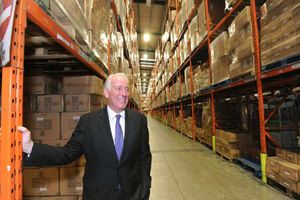25 years of Poundland empire
Tomorrow morning Jim McCarthy the chief executive of Poundland will bury a time capsule at the £1-for-everything chain's Midlands headquarters and release a flight of balloons to mark the beginning of celebrations of its 25th anniversary.

It marks a major milestone in a remarkable story that began with a box of bits and pieces on a stall in a market stall in the region. Today it has replaced Woolworths as the nation's go-to budget store – with branches in Shrewsbury, Telford and Oswestry.
It has made fortunes for the Shropshire-based man who came up with the idea and 25 years later its shares are bought and sold on the London Stock Exchange, valuing the business at nearly £800 million.
Poundland has become one of the biggest success stories to ever come out of the Midlands and, as it marks its quarter century, the £1-for-everything chain is on track for even more growth.
Chief executive Jim McCarthy, whose four per cent stake in the business makes him a multi-millionaire on paper, has a declared aim of 1,000 stores in the UK.
That is with or without the 250 99p Stores Poundland is trying to buy at the moment. That plan has suffered a major hiccup after the UK's competition watchdog called it in for a months-long inquiry that may not make a decision until October.
Mr McCarthy is going to try and persuade the watchdog to let him keep most of the 99p Stores, rather than selling off up to a third, but, win or lose, Poundland is on track to overtake Woolworth's total of 1,141 stores on the UK high street back in the late 1960s.
The former boss of Sainsbury's convenience stores is one of the biggest cheerleaders for his company and the value he says it provides for its millions of shoppers every week.
He has led the business since 2006, steering it through the 200 stores mark, opening in Southern Ireland and now in Spain, to the point where sales broke the £1 billion barrier last year at almost 600 stores in three countries.
But the roots of the business could not be more humble.
It was the brainchild of father and son market traders Keith and Steve Smith, from Willenhall, near Wolverhampton, who created the business with fellow former market trader Dave Dodd.
Following the sale of the Smith's highly successful Hooty's store in 1988 the family had planned to move to Spain. But Steve's wife Tracy had last minute misgivings about moving and they now live near Bridgnorth.
Steve recalls that it was while sitting around a swimming pool in Spain, after breaking the news to his parents, that Poundland was born.
"We were sitting around the pool talking about what I should do when dad recalled how, when we ran the market stall in Bilston, the most successful idea was an 'everything for 10p each' box. He suggested starting a shop selling everything for £1, the old one-price idea that Woolworth's started with.
"I came back and set up the office with a second hand fax machine, a second hand desk and a dream of making the business worth £100 million a year.
"This was at the depth of the recession, remember. No-one wanted to know. Banks, property companies, they all thought the idea was mad."
But dad Keith had faith, and backed his son with £50,000. The first store opened in Burton-on-Trent on December 13, 1990. "It was a tremendous gamble," Steve said later. "If I'd missed the Christmas period I would have been sunk."
Steve continued to drive the business over the coming years, building up a chain of 50 stores and even building a new headquarters on the site of the Wellman, Smith & Owen factory where his father had started out as an apprentice draughtsman at the age of 16.
Keith quit his apprenticeship just four months in because he thought he could earn more money on the market.
"It turned out I was right," he said later.
As Steve built the business Keith enjoyed a well-earned retirement, buying the Jacobean Hammer Hill House in Alveley, where he opens the gardens to the public once a year and even has a small Poundland museum.
Some of the numerous awards received by the firm are proudly displayed in the museum, including the coveted 1999 UK Retail Entrepreneur of the Year Award.
"That was down to Steve's hard work in running Poundland," Keith told the Shropshire Star last year. "As a father it makes me proud to see how well he has done.
"I came up with the idea, but Steve put everything into building up the company, so we picked up the odd award along the way.
"He even ended up paying me back the money I'd lent him to start up!"
Everything changed in 2002, when investment group Advent International bought out Steve and Keith for £50 million. Steve has gone on to a string of new business ventures, most recently an online estate agency.
Poundland continued to grow, this time with Dave Dodd at the helm. But six years later Advent decided to cash in their investment, making a very healthy profit when another investment group, Warburg Pinkus, paid them £200 million.
Warburg wanted to bring in their own man to run the business and chose Jim McCarthy. It was a case of the right man at the right time.
Birmingham-born and highly competitive by nature, the son of a former regimental sergeant major, Burma veteran and later publican, Jim McCarthy had a long retail pedigree and a successful career that had seen him working closely with Wolverhampton retail millionaire Kevin Threlfall.
Mr Threlfall started out with a cigarette kiosk on Wolverhampton Market and built up the £1 billion Midlands-based T&S Stores group that was bought by Tesco in 2002 for £530 million.
Along the way Mr Threlfall had acquired the Tipton-based Dillons chain of newsagents, where Jim McCarthy had been the group managing director. Mr McCarthy became retail director, and the duo turned T&S into a convenience giant with 1,200 stores before it was eventually snapped up by Tesco.
"I started out with Dillons as a 12-year-old paper boy in Birmingham," recalled Mr McCarthy in an interview with the Shropshire Star a few years ago.
"I used to deliver papers with my young brother – I got him to run up and down the garden paths. I was in management, until he figured out he was only getting 20 per cent of the money and went off to get his own paper round."
After taking a year off following the T&S sale, Jim McCarthy was recruited by Sainsbury's as managing director of its growing chain of Local convenience stores working under chief executive Justin King.
But, after just two years, a string of family tragedies led to a change of direction.
"It was a great job, but I was up at 5.45am catching the train to London, getting back at 9.30pm or 10pm and working after dinner until the early hours – 1am or 1.30am. It meant my wife was having to deal with an awful lot – my mother-in-law died after a short illness, a nephew had a heart attack on the day of the funeral. For the first time in my career I took a decision that put my family first."
That involved leaving Sainsbury's to take on the job at Poundland, closer to home.
"I was my own chief executive, I had more oxygen here – more freedom.
"I was very lucky. I found a fantastic business with a unique offer."
Within four years the number of stores had doubled, and Poundland kept on growing. A huge warehouse at Springvale in Wolverhampton was followed by a third and then, in 2011, Poundland made the move into Southern Ireland.
That meant dealing in euros and coming up with a new name: Dealz.
Meanwhile the UK, and the rest of the world, had plunged into recession after the credit crunch of 2007/8.
Poundland, born in the recession of the 1990s, had proved to be a successful business in good times. In tough times it turned out to be a phenomenon.
Middle class shoppers suddenly started looking for value, trying to squeeze the best deal possible for their money. German supermarkets Aldi and Lidl started their own growth surge while Poundland started seeing a dramatic change in the nature of its customers.
The phrase "flight to value" was used to describe the move by the middle classes to shop at discount stores.
Poundland can now boast that around half of UK shoppers use its stores ever year.
As the pound coins keep rolling in at the tills, Poundland has kept on growing – adding around 60 stores a year.
At some stage the company says it will launch an online operation, but it is clearly in no hurry. Its high street shops are still doing well, with sales continuing to rise.
In the meantime its owners have taken the company on to the London Stock Exchange, where its shares are currently worth more than £3 each. It is a move that sits Poundland among the heavy hitters of the UK's retail scene.
The company, which has become a go-to destination for fashionistas looking to get top brand make-up at bargain basement prices, has launched own-brand make-up and costume jewellery ranges.
It has also seen the success of its first celebrity endorsement deal, producing a hugely successful range of baking goods with actress, celebrity baker and Sixties icon Jane Asher.
The success of that venture has just resulted in the launch of a DIY range with Tommy Walsh, the TV builder who starred in BBC's popular Ground Force series.
As Poundland celebrates its first 25 years its momentum appears unstoppable. And that can only be good for shoppers.
At the same time last year it opened the first of its stores in Spain, in Torremolinos, under the Dealz brand used in Eire. That has been followed by around half a dozen more, three in Madrid, and Poundland aims to have 10 open by next year.
The success of the Spanish stores will lay the ground for Poundland's expansion elsewhere in Europe, although the company is keeping tight-lipped over which country is next on its list.
At the same time Poundland faces continual pressure to get the best value it can for its own money, ensuring that it can buy goods it can sell for £1 to give its customers the feeling of getting a good deal for their cash.
That has seen it securing deals with big names like Toblerone, Cadbury's and Thorntons to offer specially packaged Poundland versions of their usual products.





